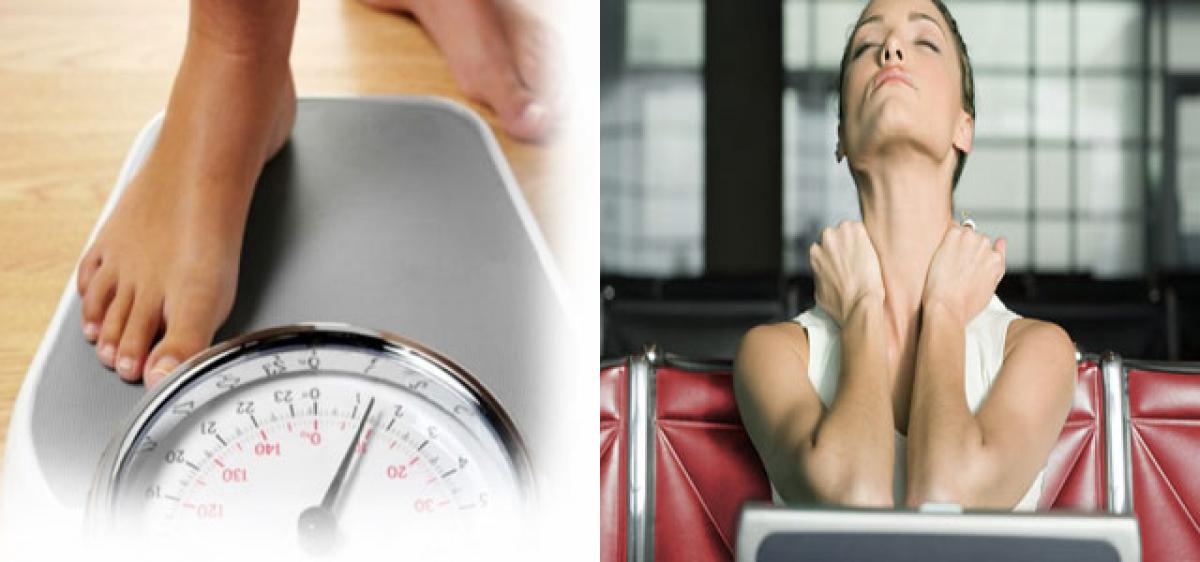Live
- All you need to know about PAN 2.0
- Akasa Air redefines travel experience with industry-first offerings
- MP: Residents stage protests against liquor shop in Indore
- Telugu Actor Shri Tej Booked for Alleged Cheating and False Promise of Marriage in Live-in Relationship
- Toyota Kirloskar Motor Celebrates 1 Lakh Urban Cruiser Hyryder on Indian Road
- MLS: New York City FC part ways with head coach Nick Cushing
- Delhi CM says Centre cutting AAP voters’ names from rolls, BJP hits back
- Hyderabad Metro Rail Phase-II Works to Begin in Old City in January 2025
- Odisha: 668 persons killed in human-elephant conflicts in last three years
- DEFENDER JOURNEYS: TO EMBARK ON ITS THIRD EDITION FROM NOVEMBER 2024
Just In

37-year-old Neeta (name changed), an IT professional joined a gym to lose the extra kilos. When even the high intensity workouts could not be of help, she decided to get her thyroid levels checked. She was shocked at the diagnosis of hypothyroidism.
Unexpected change in weight can be a sign of thyroid
37-year-old Neeta (name changed), an IT professional joined a gym to lose the extra kilos. When even the high intensity workouts could not be of help, she decided to get her thyroid levels checked. She was shocked at the diagnosis of hypothyroidism.
Ria on the other hand, was happy to be that slim and trim girl without much effort from her side. But her uneven menstrual cycle was a cause of concern. On her parent’s insistence, she got her thyroid levels checked and was diagnosed with hyperthyroidism.
While 1 in 10 adults in India suffer from hypothyroidism, a study conducted by India Thyroid Society in 2015 reports awareness for the disease ranked ninth as compared to other common ailments such as asthma, cholesterol problem, depression, diabetes, insomnia and heart problem.
Unexpected weight gain or loss can be a sign of thyroid disease. Now-a-days many young people in their late 30’s suffer from thyroid disorder. The condition generally goes undiagnosed as they do not seek medical advice and tend to neglect initial symptoms.
With the changing lifestyle patterns, in many cases patients suffer combined disorders like thyroid disorder and diabetes or thyroid disorder and obesity.
In some cases, women after conceiving are diagnosed with thyroid disorder as the body needs to meet the increased thyroid hormone requirements of the developing foetus and the mother’s metabolic functions during pregnancy.
Therefore, women should undergo a prenatal check-up before pregnancy to avoid any risks. Medications prescribed are safe to consume, if a woman is diagnosed with thyroid disorder during pregnancy.
One out of every eight women will develop thyroid disorder in her lifetime. Generally, women in the age group of 30-45 years are more prone to developing thyroid.
Below mentioned are some early signs and symptoms of thyroid
- Feeling tired all the time
- Unexpected weight gain or loss
- Irregular menstrual cycles in females
- Neck swelling
- Muscle or joint pain
- Dry skin and brittle nails
- Heavy hair loss
- Constipation
- Regular snoring during sleep
- Increased blood pressure
- Frequent mood swings, anxiety and stress
There are mainly two types of thyroid disorders - hypothyroidism and hyperthyroidism. Some of the common symptoms of Hypothyroidism include weight gain, dry skin, depression, and lethargy. Whereas weight loss, insomnia, heat intolerance, palpitations are the signs of Hyperthyroidism.
There is not much that a person can do after he/she is diagnosed with thyroid disorder. However, managing stress levels, monitoring diet and consuming prescribed medications can help to control the situation.
People can suffer from thyroid disorder if they have Grave’s disease, pituitary gland malfunction or a family history of thyroid. Some of the other reasons that can trigger thyroid disorder include high stress levels, uncontrolled diabetes or other hormonal imbalance in the body.
Read on some dietsuggestions for people suffering from hypothyroidism and hyperthyroidism:
Hypothyroidism
Foods to include: Include iodine rich foods like iodised salt, foods rich in vitamin C and antioxidants like tomatoes. Also, foods rich in iron and vitamin B like whole grains, beans, nuts, mushrooms and dairy products should be included in diet.
Foods to avoid: Avoid eating raw foods like cauliflower, broccoli, cabbage, strawberries, spinach, peanuts, millets and soya products
Hyperthyroidism
Foods to include: Include food cooked in olive oil, dry fruits like walnuts, apricot, brown breads, grains and vegetables
Foods to avoid: Avoid the consumption of soda drinks that contain added sugar like soft drinks and alcohol. Limit the consumption of coffee as it contains caffeine. Also, cut off red meat, mutton and white bread from diet
By: Dr Anand N S
The writer is a consultant- Laparoscopic & Metabolic Surgery, Columbia Asia Hospital

© 2024 Hyderabad Media House Limited/The Hans India. All rights reserved. Powered by hocalwire.com







